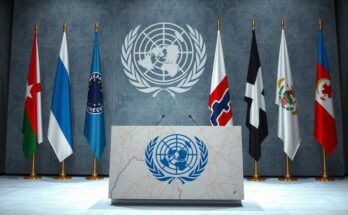On January 27, 2025, the UN Human Rights Council (HRC) assessed Iraq’s human rights record in its fourth Universal Periodic Review (UPR), gathering 263 recommendations from 93 states. These encompassed diverse issues, such as the human rights framework, freedom of expression, and the death penalty. MENA Rights Group submitted two shadow reports highlighting critical concerns and presented findings during a pre-session by UPR-Info, setting the stage for Iraq’s accountability.
Significant attention was directed at the Iraqi High Commission for Human Rights (IHCHR), which, after losing its A status, was urged by several states, including the Republic of Korea, to ensure compliance with the Paris Principles. Iraq faced recommendations focusing on ratifying outstanding treaties like the Rome Statute and the Optional Protocol against Torture to bolster its human rights partner frameworks.
Though Iraq reported advancements in freedom of expression, the reality starkly contrasts these claims. Repression remains pervasive in both Federal Iraq and the Kurdistan Region of Iraq (KR-I), with violent crackdowns on peaceful protests occurring post-reviews. Recommendations from states like the United Kingdom emphasised the need for investigating such violence against protestors while advocating for the respect of peaceful assembly.
The state of civic space continues to diminish, with human rights defenders (HRDs) facing intimidation and detention, especially in Federal Iraq. Vague laws have been exploited to silence dissenters, prompting Norway, Finland, and Spain to urge respect for HRDs’ rights to operate freely from fear of persecution.
Enforced disappearances remain a grave concern, with Iraq holding one of the highest rates of missing persons globally, estimated between 250,000 to one million. Though a Draft Law is underway, it lacks necessary legal clarity. Mexico and Croatia recommended Iraq classify enforced disappearance as a crime and establish an official register for missing persons.
With the death penalty still in force, and a substantial number facing execution without fair trials, 27 states proposed Iraq adopt a moratorium on executions. Nations such as Australia and Costa Rica stressed the urgency of halting executions and ensuring fair trial rights for all.
As the deadline approaches for Iraq to respond to these recommendations ahead of the HRC’s 59th session, MENA Rights Group urges Iraq to embrace essential recommendations that focus on preserving human rights, abolishing enforced disappearances, and eliminating the death penalty for a just and humane society.
Iraq underwent its fourth Universal Periodic Review on January 27, 2025, receiving 263 recommendations regarding its human rights performance. Key issues addressed include the deterioration of freedom of expression, the plight of human rights defenders, enforced disappearances, and the continued application of the death penalty. MENA Rights Group stressed the importance of accepting these recommendations before the next HRC session in summer 2025 to ensure accountability and protection of human rights.
In summary, Iraq’s fourth Universal Periodic Review revealed critical issues in its human rights framework, including the repression of free expression and assembly, a diminishing civic space, and the ongoing practice of enforced disappearances. With 263 recommendations, international bodies stress the importance of reforming legislative frameworks and implementing key human rights principles, particularly regarding the death penalty. The upcoming responses from Iraq will determine its commitment to uphold human rights obligations as it moves into its fifth review cycle.
Original Source: menarights.org



